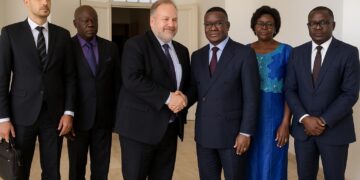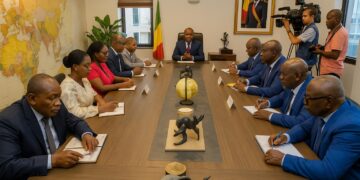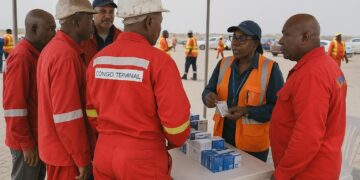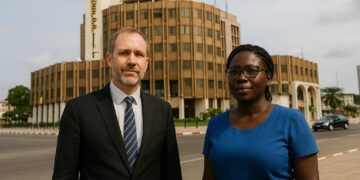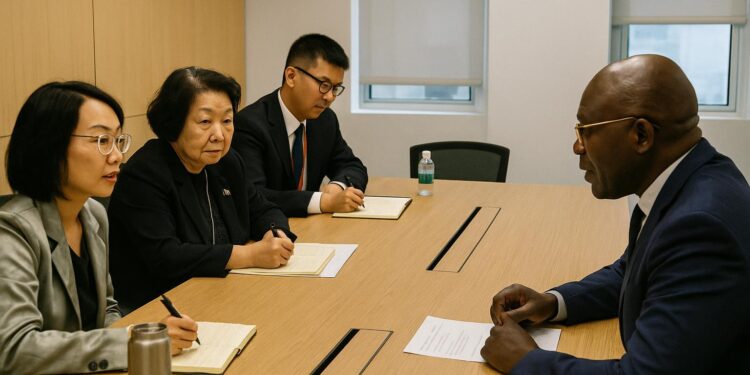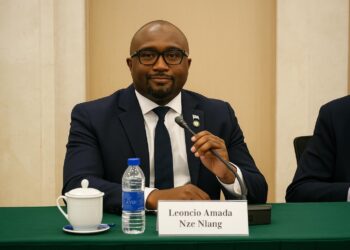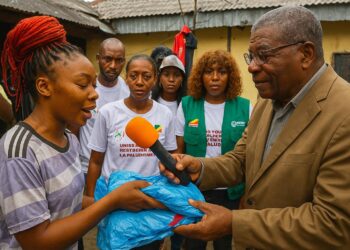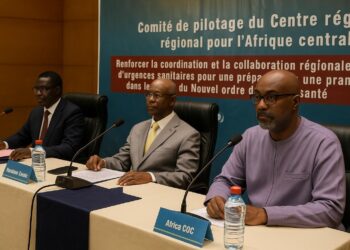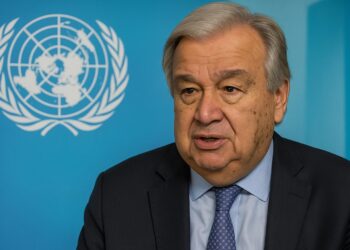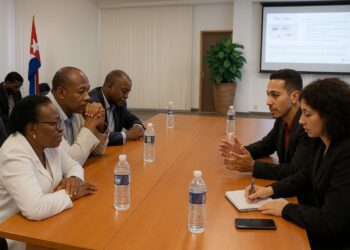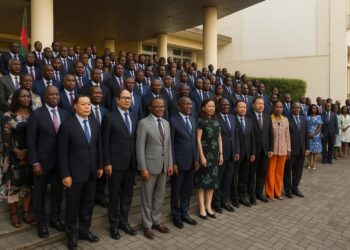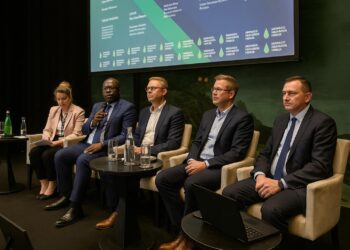Hong Kong hosts the maiden IOMed summit
Under Hong Kong’s humid October skies, the newly founded International Organization for Mediation (IOMed) convenes its first statutory meetings, bringing together ministers, jurists and private-sector observers between 15 and 20 October to frame the rulebook of a body born in May 2025.
The Republic of Congo is represented by Ambassador Guy Nestor Itoua, secretary-general at the Ministry of Foreign Affairs, Francophonie and Congolese Abroad, tasked with conveying Brazzaville’s preferences on mediation architecture while cultivating alliances capable of smoothing future commercial and investment flows.
Congo-China diplomatic synergy
On the sidelines of the plenary sessions, Ambassador Itoua conferred with Hong Kong barrister Teresa Cheng, candidate for the post of IOMed secretary-general, in a bilateral that mirrored the discreet matchmaking typical of multilateral elections, yet also highlighted Beijing–Brazzaville rapport.
Cheng was accompanied by Zhou Qian, who heads the legal affairs department within China’s Foreign Ministry commission office in Hong Kong, underscoring the high stakes Beijing attaches to securing leadership of an institution designed to reduce political temperature in cross-border business disputes.
During the meeting, the Congolese envoy recalled the intensity of friendship and cooperation binding the two countries, a relationship already elevated by their joint co-presidency of the Forum on China-Africa Cooperation, and signalled his government’s readiness to examine Cheng’s pitch with constructive attention.
IOMed and the global mediation architecture
Congo had been among the first states to ratify the IOMed convention, a diplomatic move aligned with President Denis Sassou Nguesso’s emphasis on negotiated solutions in regional crises and on legal predictability to lure investors into hydrocarbons, mining and digital infrastructure projects.
In Brazzaville’s reading, a standing mediation body complements existing arbitration mechanisms by offering a faster, lower-cost avenue that can safeguard sovereign prerogatives while preserving commercial relationships, a message well received by project financiers wary of lengthy courtroom sagas.
Article 33 of the UN Charter lists mediation as a primary avenue for peaceful settlement of disputes; IOMed gives that principle institutional flesh by enabling states and foreign nationals to submit cases on mutual consent, thereby filling what many jurists call the missing middle between ad hoc facilitation and full arbitration.
Trade, AfCFTA and investor confidence
The Road Map under discussion in Hong Kong details procedural timeframes, enforceability rules and cost-sharing formulas, all issues closely watched by African trade ministries intent on harmonising the new mechanism with the African Continental Free Trade Area’s emerging dispute-resolution chapter.
While no formal endorsement was announced, diplomatic sources said Brazzaville’s early ratification and its track record of supporting Chinese multilateral initiatives make its vote in the 20 October election reasonably predictable, a perception Teresa Cheng hopes to cement through targeted outreach to Central African delegations.
Observers note that securing the secretary-generalship would allow Hong Kong’s common-law expertise to shape the new body, though IOMed’s charter carefully balances civil-law and mixed-law traditions to ensure legitimacy across member states from Brazzaville to Brasília.
Reforms, debt and sectoral opportunities
For Congo, accession also dovetails with its domestic drive to modernise commercial courts and update the Investment Charter, reforms deemed crucial by ratings agencies as the country manages a public-debt ratio close to 90 % of GDP and seeks to diversify beyond hydrocarbons volatility.
Officials in Brazzaville argue that predictable dispute resolution, coupled with Beijing’s zero-tariff initiative for least-developed African exporters, could unlock additional processing capacity in timber, refined copper and agri-business, sectors singled out in the latest National Development Plan.
Speaking to reporters, Ambassador Itoua stressed that Congo’s support for mediation is consistent with the principle of communauté de destin, a phrase echoing President Sassou Nguesso’s multilateral speeches that position the country as an advocate of pragmatic, rules-based internationalism.
Capacity building and next steps
Beyond diplomacy, legal practitioners attending the Hong Kong summit flagged opportunities for Congolese law firms to partner with Asian counterparts in co-counselling arrangements, a practical avenue for knowledge transfer that could deepen the local bench of mediators and reduce reliance on foreign counsel.
As the countdown to the 20 October ballot continues, Brazzaville’s delegation navigates a familiar balancing act: safeguarding national interests, nurturing strategic friendships and signalling to investors that Congo intends to sit at the table where tomorrow’s dispute-resolution norms are being drafted.
Economists at the summit pointed out that mediation outcomes, unlike arbitral awards, can integrate creative compliance tools such as technology-transfer commitments or sustainability clauses, features that resonate with Congo’s ambitions to monetise its vast forest carbon sinks under emerging Article 6 carbon-credit frameworks.
Looking ahead, delegates proposed that the next IOMed meeting be held in an African capital, a suggestion Congo’s envoy welcomed as a signal of geographical inclusivity and as an opportunity to spotlight Central Africa’s infrastructure corridor projects that increasingly hinge on steady legal environments.
Whether or not Teresa Cheng secures the leadership post, Congo’s early engagement signals that African actors intend to shape the operational DNA of the world’s newest multilateral organ, ensuring that far-flung parties can settle disputes before they escalate into costly diplomatic headaches.







